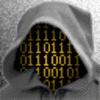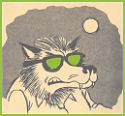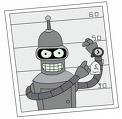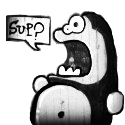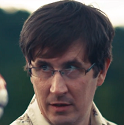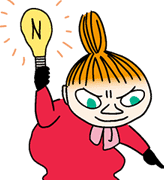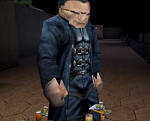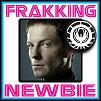|
Kind of been neglecting this thread, but not my reading: Finished The Way of Shadows, Shadow's Edge and, Beyond the Shadows; books one, two and three of the of The Night Angel Trilogy by Brent Weeks. The story begins with 'Azoth', a street urchin 'Rabbit' from the Warrens. He's part of a street gang and is subjected to a lot abuse from the leader. He desires to be apprenticed to the best wetboy in the city, a type of super assassin. From there the cast balloons to include a wide host of very memorable characters and monsters. The story goes from one of humble beginings to a rollercoaster of epic proportions. For the rest of the story you're going to have to pick it up and read it. But I will say this, it's a strong fantasy book and while not literary genius it is very entertaining. The action scenes (of which are numerous) are very well presented. The trilogy has an incredible climax at it's finale and should be read for that alone. There are some annoyances. For example you can tell theres a minor anime influence in the japanese type names and the like. It also feels fairly generic when in begins, but it soon grows out of that and becomes more unique. If you enjoy fantasy, by all means get this series.
|
|
|
|

|
| # ? Jun 1, 2024 01:45 |
|
John Adams by David McCullough - Recently read the companion volume 1776, which got me interested in reading JA. Really liked it - it's an extensively researched bio of Adams including numerous excerpts from the massive body of letters he wrote over his lifetime. As with 1776, it was very well-written and filled in a lot of the details that I wasn't aware of about the period as well as providing an interesting perspective on Franklin, Jefferson and other major figures. Definitely will read McCullough's Truman biography as well.
|
|
|
|
Anunnaki posted:What the hell was the book about if it's titled "The Secret History of a Full-Time Eater", if not his job as the NY Times restaurant critic? Manily his childhood. His loving childhood. Oh, and his lifelong struggle with bulimia. Worst 27 bucks I ever spent. Waste of time.
|
|
|
|
Finished up The Black Company by Glen Cook. It had a bit of a rocky start, and I wasn't really enjoying it at first. The names seemed really goofy, I mean come on: Limper = he limps, Silent = he doesn't talk, One Eye = he's got one eye. Eventually I became desensitized to the goofy names and the story started to pick up a bit. I think I'll snag the second book at some point, but I'm not in a hurry. 6/10 I'd say.
|
|
|
|
The Epic of Gilgamesh, author anonymous. One of the first written epics, overall very interesting from a historical perspective (but not really the most gripping of stories).
|
|
|
|
I finally finished Gravity's Rainbow after putting it down in disgust about half a year ago and a third of the way through. There were parts of this book that I hated but I was surprised by the latter parts of the novel. The way the book wound down and became increasingly depressing and desperate was really good. I don't doubt that I missed a lot since it kept jumping around and bringing back characters I'd nearly forgotten about but I don't think I'm up to reading it again for a while.
|
|
|
|
I just finished One Second After by William Forstchen. It has been discussed at length in the "Post Nuclear War Novels" thread but in summation it's a mediocre novel with (at least in my opinion) really interesting subject matter. I found some parts to be pretty gripping, especially the conflicts with other towns and groups, but mostly continued the story because I am interested in the threat of EMP. I'm also just about finished with American Pastoral by Philip Roth, which I am enjoying but not as much of some of his other stuff that I've read (Portnoy's Complaint, The Plot Against America, Our Gang, and Goodbye Columbus). I have a few more of his to read but I may take a break from Roth after this one. My girlfriend is pressing me to read Barney's Version by Mordecai Richler, so I probably will go to that next.
|
|
|
|
The Tipping Point. An enjoyable read, though the chapters only have a tenuous link, and Gladwell's theories are pretty thin. For example, Sesame Street doesn't have much to do with his Connectors and Mavens theory, nor does teenage smoking really. But I liked it more than Blink, which basically said you should trust your gut reaction, except when you shouldn't.
|
|
|
|
Already Dead by Charlie Huston. Sure it's a vampire book, but that shouldn't stop you from reading it. I joke. While garbage like Twilight pollutes the vampire genre, it's easy to get turned off from books about bloodsuckers. I took a risk and was handsomely rewarded with a gruesome and original story about a pseudo-detective/hired thug named Joe Pitt stuck in the middle of rival vampire gangs in New York City. He's dealing with a missing girl, a zombie outbreak, vampire politics, all while fighting his growing hunger to grab the next person he sees and gulp all the blood from their body. The author has the dry humor that I enjoy and the knack for making the gore leap off the page. There's a little bit of unnecessary relationship drama thrown in, but I suppose that one could argue that it helps make the main character more relatable. It's short enough to make the slow parts tolerable, knowing that the story will pick up after a few pages. I'll probably give the next book in the series a try to see if the premise grows stale. Overall I recommend it - it's not great, but it is definitely a solid "good."
|
|
|
|
voting third party posted:I finally finished Gravity's Rainbow after putting it down in disgust about half a year ago and a third of the way through. There were parts of this book that I hated but I was surprised by the latter parts of the novel. The way the book wound down and became increasingly depressing and desperate was really good. I don't doubt that I missed a lot since it kept jumping around and bringing back characters I'd nearly forgotten about but I don't think I'm up to reading it again for a while. What did you think of the ending? This was a major point of contention among my book group–most everyone hated the ending, but I think it might be the best ending of any book I've ever read. I love the final scene.
|
|
|
|
I finally picked up and finished Ender's Game and loved it... I just picked up Ender's Shadow. I can't believe I waited so long to get into this series... I can't wait to jump in and see it all from Bean's perspective.
|
|
|
|
Enders Game and Ender's Shadow were great. The Ender series progressively got worse, while the Bean series kept going strong. I'd follow that path as opposed to the Speaker for the Dead and all that trash.
|
|
|
|
I just finished Ask The Parrot by Richard Stark. Good read, reminded me of a Coen Brothers movie.
|
|
|
|
Infinite Jest: gently caress yes, I finally finished this thing. It's really hard to even wrap my mind around half the stuff that's happened in this book (though, for a 1000 page book, not a lot really goes on). This is an incredible novel and everybody who is serious about reading needs to give it a shot. David Foster Wallace has some of the best style I've seen, and the way that everything slowly comes together through such disparate bits and pieces is incredible. The one piece of advice I'd give to newcomers to the novel is this: Approach it like a short story collection at first - for, say, the first 100 pages. It feels weird trying to read what is supposed to be a book at first when there is such a nonlinear and seemingly random story going, so don't even try to connect anything until it starts to come together on its own. I honestly think that the second time I read this (not now, though) will be better than the first. Up next was going to be Gravity's Rainbow, but I need a rest from postmodern behemoths. Gonna read a Pixies and Modest Mouse biography first and then maybe an easier fictional read before I hit GR.
|
|
|
|
Snow Country by Yasunari Kawabata. This is an elegant book with great imagery, but it came across as a mere collection of beautiful but mystifying vignettes. Perhaps I'm not tuned to the subtleties of Japanese culture, and miss the larger referents. The book is consumed by the relationship of a married guy with a geisha in a northern tourist town; the guy is a dick by my standards, but probably that's not a fair judgment in context. Worth a read if you're in the market for something very mellow and introspective. The Cloven Viscount by Italo Calvino. A macabre and fantastic tale, part of his Our Ancestors trilogy. Dude gets blown in half by a cannon during a battle with the Turks in the Crusades, and each half survives with a different personality. Yes, whimsical. I've liked Calvino ever since I followed a recommendation by John Barth to read Cosmicomics, a postmodernist classic. I have a few more of his books to read, and I'm looking forward to them.
|
|
|
|
Rosemary and Son by Ira Levin. Yes this is a sequel to Rosemary's Baby written by the same author about 30 years later. Nowhere near as interesting as the original as you just end up with Rosemary stumble around not doing anything useful really. A large chunk of the book is Rosemary trying to decide if her son (who is the son of the devil) is evil or not with the book being extremely vague in this regards. Levine ends up writing himself into a corner and ends in a retarded fashion of it was all a dream (this includes the first novel,) OR WAS IT?
|
|
|
|
-
Serious Sam fucked around with this message at 08:30 on May 15, 2011 |
|
|
|
I'm inches away from finishing The Cat Who Could Walk Through Walls but I'm a giant Heinlein nerd, so I can't suggest the book for everyone. If you haven't read about three or four other books from him, you won't know what's going on half the time. That said, it's very well written and reads like Hitchhikers Guide to the Galaxy for adults.
|
|
|
|
Finished reading Thomas Pynchon's The Crying of Lot 49. Really enjoyed it, and the Spanish language references/Remedios Varo references were pretty amusing. That being said, while reading it I felt like I was watching a (good) David Lynch movie. At least the last part did.
|
|
|
|
I just finished wading through Palimpsest by Catherynne Valente. It took me two months--a combination of travel with the heavy prose, and sometimes I felt like I was just wading through a swamp to read it, but I thoroughly enjoyed it. I was particularly interested by the tattoo aspect of things. I usually can read a book like that in a matter of days if not a week at the outside, but this just read so heavily for me, I had to take my time and work with it in small chunks.
|
|
|
|
I just finished The Child Thief by Gerald Brom. It takes the original Peter Pan story by J.M. Barrie and gives it a darker edge, using a lot of Celtic and welsh myths to fill the story out. For example, Neverland is replaced by Avalon, complete with The Lady in the Lake and Excalibur. That may sound like something that you might see on fanfiction.net but it was actually very, very good. What made the book so good for me was his depiction of Peter. Peter is still the young boy who refuses to grow up and spends his days playing in an enchanted land with lost children, but there are also times where he can be a downright bastard. I do recommend this to anyone that enjoys Peter Pan and would love to read someone else’s take on the character. I now want to go back a re-read the original story by J.M. Barrie. I will write a fuller review of The Child Thief once I refresh myself of the original Peter Pan and am able to compare the two.
|
|
|
|
Pynchon's Mason & Dixon. Really dug this all the way through, largely in part due to the fairly straightforward narrative (compared to Gravity's Rainbow) along with absurd comedy, philosophical meanderings and shadowy conspiracies all woven into a reimagining of Mason and Dixon's career including the charting of the Mason-Dixon Line. The "olde tyme" 18th-century style takes a little getting used to but once I got into the book, it flows very well. Pynchon has really started to grow on me, so I'm a lot more up to reading his other stuff that I haven't tackled yet.
|
|
|
|
Just finished another one of the recommended book's. Choke this time. A really good one. Definitely on par with fight club. Now I'll have to decide on whats next.
|
|
|
|
I just finished At All Costs, finishing off the Honor Harrington series for me. I thought it was a pretty good series at first, but the stories got painfully repetitive as they moved along, with the last book being the absolute most painful experience in the series. Going to be starting Ravenor: The Omnibus by Dan Abnett next. Big fan of the Gaunt's Ghosts and Eisenhorn series so I'm hoping this one will be excellent as well.
|
|
|
|
Just finished Bad Samaritans by Ha Joon Chang. It's a contrarian review of development economics and trade policy highlighting the significant differences between the industrialization and fiscal/monetary policies used by now-developed nations and the policies that such nations impose on or advocate for developing countries. The main thesis (though the book explores many many other points) is that developed nations protected their "infant industries" during the period of development, weaning these industries off protection and advocating unrestricted free trade only when it was in their interests, as likely exporters, to do so (i.e., to get potential customers to open their doors, as it were, and prevent the emergence of competing industries abroad). There is also a fascinating, and depressing, selection of materials on the relationship between economic policy/interests and democracy/forms of government. The biggest limitation in what I found to be a generally persuasive account is that there is a pointed strain of advocacy that runs throughout. I am familiar in a general sense with the main lines of economic thought from Smith forward, but I'm not a specialist and wasn't really able to get a feeling for what the historical and theoretical responses would be from anyone who had a different perspective. Overall, though, an excellent book, well worth reading.
|
|
|
|
Dudikoff posted:Already Dead by Charlie Huston. Sure it's a vampire book, but that shouldn't stop you from reading it. I joke. While garbage like Twilight pollutes the vampire genre, it's easy to get turned off from books about bloodsuckers. I took a risk and was handsomely rewarded with a gruesome and original story about a pseudo-detective/hired thug named Joe Pitt stuck in the middle of rival vampire gangs in New York City. He's dealing with a missing girl, a zombie outbreak, vampire politics, all while fighting his growing hunger to grab the next person he sees and gulp all the blood from their body. The author has the dry humor that I enjoy and the knack for making the gore leap off the page. There's a little bit of unnecessary relationship drama thrown in, but I suppose that one could argue that it helps make the main character more relatable. It's short enough to make the slow parts tolerable, knowing that the story will pick up after a few pages. I'll probably give the next book in the series a try to see if the premise grows stale. Overall I recommend it - it's not great, but it is definitely a solid "good." Huston really grabbed me with his Hank Thompson trilogy of crime novels so I gave this a shot over the weekend after I finished Pynchon's Mason & Dixon. Liked it a lot as well. Not much for vampire fiction in general, though Huston's style and spin on the mythos makes it a fun read. I'll likely grab the next book in the series eventually as well.
|
|
|
|
Finished "Craze: Gin and Debauchery in an Age of Reason" by Jessica Warner, which is a brief look at the cultural climate surrounding all the different Gin Acts of the mid-18th century. Some interesting stuff about political arithmetic and class sociology and some especially fascinating digressions on the proto-feminist elements of the gin scene, but altogether maybe a little bit too focused on the legislative details. I came out of it with a much appreciated understanding of the Acts themselves, as well as their roots and consequences, but none of the figures that populate the book really came across particularly vividly. Sure, you could say, it isn't a historian's job to be a novelist, but it shouldn't be difficult to make Robert Walpole at least a little interesting. Overall, too dry for a great piece of pop history, too light for a great academic study, but good. I also read "Groundswell" by Charlene Li and Josh Bernoff, a nice if already somewhat out-dated guide to adapting marketing and R&D strategies to a predominantly online customer base. As a young fella a lot of the material seemed kind of self-explanatory, but still had some good food for thought. Finally, I finished "The Collected Poems of Steve Smith," which held together more as a single book than a lot of poets' complete collections do. Smith is hard to pin down-- too whimsical to be a modernist and too morbid to be a light poet-- but I feel like she's something of an invisible grandmother to a lot of people writing right now. Very, very British (with some traces of Edward Thompson, I think, which feels weird but right) and often very, very funny.
|
|
|
|
I just finished a couple novels by Graham Greene - Brighton Rock and The Quiet American - I'd never read anny Greene before and thought that these two books, written about 20 years apart, would be a good intro. I enjoyed both immensely, and The Quiet American in particular was amazing, one of the best novels I've ever read in terms of the quality of the prose and the structure, though most of the characters are a bit on the thin side, mostly being more symbols than actual people. I've read a few books about the Vietnam War from various perspective but nothing before about the First Indochine War and the various political and cultural intrigues going on in the 50's and the novel was fascinating from that standpoint as well. The book is definitely considered a classic for good reason. Brighton Rock was more pure entertainment, there was a lot of reflection on morality and life after death in there that would probably be more poignant for a Catholic than it was for me. But still, excellent suspense story, a wonderfully grim plot, and the dialogue was great.
|
|
|
|
I guess I got what I deserved for reading Palahniuk yet again, but Pygmy was a special blend of insipid that I've never seen before and hope never to see again. The book is written from the perspective of a meticulously trained teenage operative from some unnamed Communist country that sent him to America to kill as many capitalist pigs as he can and impregnate their women or something. I'm not exactly sure, because the actual objective of "Operation Havoc" shifts constantly without any explanation. Anyway, despite being a linguistic genius, the protagonist of this book speaks entirely in Engrish. Now, this leads to some mildly amusing lines such as "paste of teeth" and things like that, but it gets grating after awhile. However, it's no more grating than the completely off-the-wall poo poo that makes this story seem more like a fever-dream than the engaging narrative it could have been. I can't actually mention anything specifically without spoilers, but suffice to say at one point Pygmy climbs a statue of Jesus suspended from a church ceiling that must be at least fifty-feet tall (he hangs from Jesus' nipple for awhile). The ending is far more retarded. I'm actually completely certain that Chuck got tired of struggling to crank out page after page of "clever" Engrish and just said, "gently caress it, I'm going to shoehorn in a happy ending without caring that absolutely none of the things that happen in it are remotely plausible or even consistent with the rest of the story." If you're wondering just how terrible it is--it's a two-page-long diary entry where the protagonist says that America isn't that bad (directly contradicting everything he said up to that page), and that he and his new father got away with stealing sensitive materials from the government without punishment, and that he got away with rape, and that he righted all of the wrongs and is going to have a happy childhood in the nation he spent over thirty chapters trying to murder. The only thing this book has going for it is the fact that all of its criticisms of American consumerism and lifestyles are basically correct. But there are far, far better books that discuss these topics, so I'm not about to let this piece of poo poo slide.
|
|
|
|
Oldbill posted:I guess I got what I deserved for reading Palahniuk yet again, but Pygmy was a special blend of insipid that I've never seen before and hope never to see again. The book is written from the perspective of a meticulously trained teenage operative from some unnamed Communist country that sent him to America to kill as many capitalist pigs as he can and impregnate their women or something. I'm not exactly sure, because the actual objective of "Operation Havoc" shifts constantly without any explanation. Hahaha, gently caress that guy so fucken hard. I'm glad other people are willing to read his new poo poo and tell me how terrible it is because I'm sure as gently caress not gonna.
|
|
|
|
American Gods, Neil Gaiman. I liked it overall but I felt that some of the scenes added literally nothing to the plot and served merely the prurient interest of the audience. The plot twist was well-executed but become obvious well before being actually revealed. Not worth the massive amount of praise it received, but still quite good. The Diamond Age or, A Young Lady's Illustrated Primer, Neal Stephenson. I would change nothing about this book. It is sublime. To be perfectly fair I've always really enjoyed Stephenson's work.
|
|
|
|
Oldbill posted:I guess I got what I deserved for reading Palahniuk yet again, but Pygmy was a special blend of insipid that I've never seen before and hope never to see again. The book is written from the perspective of a meticulously trained teenage operative from some unnamed Communist country that sent him to America to kill as many capitalist pigs as he can and impregnate their women or something. I'm not exactly sure, because the actual objective of "Operation Havoc" shifts constantly without any explanation. I've never actually read any of his books but this sounds hilarious.
|
|
|
|
Invisible Cities by Italo Calvino. Postmodernists don't always write fat, weird books; sometimes they write mythopoeic gems like this one. Marco Polo describes imagined cities to Kublai Khan. Of course ... who could do it better? Brilliant, lyrical, evocative, playful, but not for everyone because it's too ethereal and diffuse for anyone looking for a story. The Time Traveler's Wife by Audrey Niffenegger. I didn't expect to like this all that well, but I did. The time traveling is not a gimmick but an inexorable logic that drives the book through the beauty and sadness of romance and death. I wondered at one point if this book could be considered science fiction, and I think the answer is not simple, but basically no. Good job of genre-bending by Niffenegger, though, and good book overall.
|
|
|
|
Newton's Cannon by Gregory Keyes. What would happen if all Newton's alchemical experimentation didn't end in an amusing historical note, but started a new age of scientific discovery! An age...of unreason! See...young Ben Franklin meet Blackbeard! See...magic printing presses in action! See...Louis XIV not get his head lopped off! See...new weapons and technology that draw their power from the aether! See...horrible beings from other dimensions! See...Isaac Newton in a flying boat! ...I'll admit the premise is a bit odd, but it was interesting to see various aether theories treated as if they were real. The plot wasn't bad, and it kept my attention. Definitely a "fun" read, but a good enough one to interest me in snagging the second book in the series.
|
|
|
|
Theseus posted:American Gods, Neil Gaiman. I liked it overall but I felt that some of the scenes added literally nothing to the plot and served merely the prurient interest of the audience. The plot twist was well-executed but become obvious well before being actually revealed. Not worth the massive amount of praise it received, but still quite good. ^I just finished this one too, and I think I agree with you completely. A very good book with a few scenes where the author completely nerded out. In the last hundred pages or so, it went from pretty good book to great book and then ended. Also finished- Hard-Boiled Wonderland and the End of the World by Haruki Murakami. Read this on the strong recommendation of my girlfriend and wasn't disappointed. Perfectly surreal, and great fun to read from page to page. Even though the book is translated from Japanese, the author's unique voice really comes through. Slaughterhouse-Five by Kurt Vonnegut. I had never read a Vonnegut book up until now, and I think I'm a fan.
|
|
|
|
Space Harrier posted:Hard-Boiled Wonderland and the End of the World by Haruki Murakami. Read this on the strong recommendation of my girlfriend and wasn't disappointed. Perfectly surreal, and great fun to read from page to page. Even though the book is translated from Japanese, the author's unique voice really comes through. Yeah, Murakami really reads like Murakami, regardless of who's done the translation. Probably has something to do with the fact that, from a Japanese POV, he's an extremely Western author.
|
|
|
|
Recently finished the Ender quartet. It's hard to believe all four books are supposed to be part of the same series. Ender's Game merits the praise it gets from people. The writing is a bit weak at times, and there are a lot of undeveloped characters, but the underlying story and the descriptions of tactical combat are just really interesting to follow. Easily recommended. Speaker for the Dead doesn't have any real reason to be a sequel to Ender's Game. The plot threads connecting the two are so thin that an original history could probably have been included in the space of five pages. This book seems based more on one brief conversation between Ender and one of his compatriots in the first book about the nature of the aliens and the war that ends up being true in spirit if not literally true, as the buggers do exist but have no interest in fighting humans. And the author apparently decided that this little bit of philosophy was what really made the first book, because Speaker is absolutely packed with this sort of deliberation. Despite its curious status as a sequel to Ender's Game, it's still not a bad read if you can deal with all the philosophy and Catholic stuff. Also the fact that most everyone on Lusitania is an rear end in a top hat. I'm going to lump together my comments about Xenocide and Children of the Mind because they share most of the same problems. These two take the series from space philosophy to space metaphysics and finally to outright space magic. Nothing interesting happens for long stretches of time, the Lusitanians continue to be even bigger assholes, and the ending of the book is so ridiculously weird that just trying to comprehend it gives me a headache. Let's try anyway! "Peter" is not actually Peter, but rather a manifestation of Ender's psyche. He's psychically controlled by Ender, but not consciously. He became real when Jane, a sentient computer program (that is not actually a computer program but a spirit called into this dimension by the aliens and granted sentience by the Internet) took Ender outside the Universe, where anything you think about really hard pops into existence. At the end "Peter's" spirit is gone and was replaced by the spirit of the manifestation Ender made of his sister when he went outside the Universe. So he's actually the spirit of "Valentine", who isn't really Valentine (she's also Ender). Her old body is now occupied by Jane, who was about to be killed when Congress shut down the Internet's root servers. Except that first she had to wait around in a bunch of sentient trees while waiting for Peter to die so Valentine could give her a body. I guess it would be simpler to just say "Ender went outside the Universe and accidentally created Ender and Ender, and when he died his friend the Internet occupied Ender's body so that she would continue to live. To ensure that Ender wouldn't die when Jane took that body, the other Ender sacrificed his spirit, leaving an empty body so that Ender could enter it. This way Ender would live on to marry his lover Wang-Mu the genetically enhanced Chinese servant girl. Meanwhile Jane in Ender's body went on to have babies with Ender's stepson Miro, the genius who was crippled by a terrible accident but gave himself a healthy new body when he went outside the Universe. Jane can still access all the computers in the Universe and can use their processing power to teleport anywhere instantly. Oh, and everyone hopes these babies would also be psychically linked to the Internet and therefore able to travel outside the Universe, therefore keeping faster-than-light travel as a viable means of trasportation even after Jane dies. Oh gently caress it. Just don't read past the second book.
|
|
|
|
I had a number of the same issues you did and bailed in the middle of Xenocide. As an aside, I think the 'Catholic stuff' is more likely Mormon (as is its author).
|
|
|
|
Khurath posted:Oh gently caress it. Just don't read past the second book. As someone who has read all the Ender books, I would say don't read past the first book but read the Ender's Shadow series instead as it is far superior.
|
|
|
|

|
| # ? Jun 1, 2024 01:45 |
|
Otto Skorzeny posted:I had a number of the same issues you did and bailed in the middle of Xenocide. As an aside, I think the 'Catholic stuff' is more likely Mormon (as is its author). Entirely possible that it's an allegory for Mormon stuff, I know little about Card other than he's a) Mormon and b) super anti-gay rights. I just say Catholic stuff because it's a bunch of Portuguese colonists who are specifically stated to be Catholics. Edit: Theseus posted:As someone who has read all the Ender books, I would say don't read past the first book but read the Ender's Shadow series instead as it is far superior. I've had my fill of Card's writing after all that, but for anyone else who liked the first one and wants something more I would recommend the same. I can't imagine how the "Shadow" books could be worse. Khurath fucked around with this message at 05:30 on Sep 12, 2009 |
|
|





